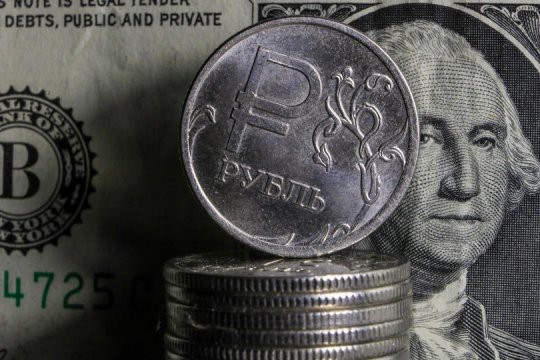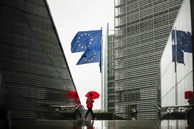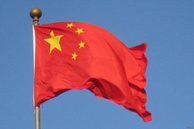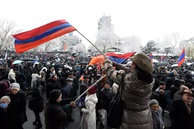The charming schemer Ostap Bender argued that he knew 400 relatively honest methods of siphoning off other people’s money. The keyword here is «relatively honest». But Bender does not hold a candle to the present-day expropriators in the West! The EU and US leaders, who have opted to get a shot at frozen Russian securities and cash resources, have no such criterion. Honesty, even if relative, is something which neither Brussels nor Washington chooses to practice in international financial relations or international law -–the sorry situation in their warring understudy Ukraine has become, for them, the main criterion of conscience, justice, and the attitude to law. The harder it becomes to maintain the Kyiv regime, insatiably begging for billions of dollars from the EU and US economies for weapons and wages, the more appetite western leaders have for Russian money which Moscow trusted to the ostensibly reputable financial institutes of Europe and America to keep. The European Union, G7 countries and Australia have frozen about €300 billion since the start of the conflict in Ukraine. More than €200 billion are in the EU, and, according to western experts, €192 billion of them are on the deposits of the Belgian depository Euroclear, one of the world’s major settlement and clearing systems. This depository serves more than 90 countries and stores €37,6 trillion worth of assets, which yield profit.
And now, «the ice has broken». After a host of hesitations and «legal discussions», the West has moved. On July 26 President of the European Commission Ursula von der Leyen announced the first tranche of over €1,5 billion to Kyiv from revenue from frozen Russian assets, which Euroclear was ordered to transfer on the same day. The cynical plundering of Russian money went into full swing after the European Council allowed in May to use the bulk of the revenue to support the current Ukrainian regime. In an attempt to “ennoble” this theft EU foreign ministers agreed in Luxemburg in June to put revenue from frozen assets into the pompously-called European Peace Fund. This “purse of peace” will then purchase a pile of weapons for Ukraine. To a total of €2,4 billion this year. On July 17 the European Parliament stepped in, having passed a resolution on support for Ukraine and urging to confiscate even the frozen Russian assets proper. Under the resolution, the EU is to supply Ukraine with everything it needs to secure a victory in military operations. The more so since prospects for plundering look enticing In the first six months alone Euroclear earned about €3,5 billion, investing the blocked resources of the Central Bank of the Russian Federation. According to forecasts, Euroclear’s total profit from Russian assets, depending on the dynamics of global interest rates, may reach €20 billion by 2027.
At first glance, the decision sounds witty. Such a thievish move in relation to Russian money was first justified by passionate speeches about “restoration” and “compensation”. But they then resolved to think bigger and channel the confiscated resources into acquiring munitions and other military joys for the Armed Forces of Ukraine. To this end, the EU leadership had to resort to a dubious legal trick. The point is that at a meeting of the EU foreign ministers Hungary voted against the transfer of revenue from Russian Central Bank assets for Ukraine’s military needs. However, since Budapest abstained while voting on receiving revenue from frozen Russian assets, they resolved that Hungary “should not participate in decision-making on the use of” these resources, EU foreign affairs chief Josep Borrell explained. Bender is chilling out, “gentlemen of the jury” have outsmarted him. Hungarian Foreign Minister Péter Szijjártó has dubbed this move as “the crossing of red lines”. The EU courtly explained that since they were not talking about private taxpayers’ money, a tranche of this kind did not require a unanimous decision of all members of the organization.
Hungary’s resistance took its toll. Borrell remarked that Hungary continues to block payments of €6 billion from the European Peace Fund as compensation for EU members which have already passed their weapons to Ukraine. «It does not stop Ukraine from receiving weapons. But EU countries will not get compensation. So, they will have few incentives to continue this practice in the future», — the chief diplomat raged. He pointed out that EU members condemn Hungary’s position on Ukraine and said that it is necessary «to send a signal that Hungary’s conduct undermines the unity of the EU foreign policy and should have official consequences». As a result, the next meeting of foreign and defense ministers was scheduled to take place in Brussels. In response, Szijjártó described what happened as «a coordinated and hysterical attack» by the ministers over Hungary’s initiatives for a settlement of the Russian-Ukrainian conflict.
According to Borrell, the first tranche from revenue from the Russian assets will be used to buy ai defense systems and artillery pieces. And also — which is new — to buy supplies for the Ukrainian defense industry. The US and German weapons concerns are happily rubbing their hands in anticipation. Naturally, Moscow did not appreciate this «wittiness». Presidential press secretary Dmitry Peskov said that such “thievish moves cannot be left unanswered». That the Russian resources will be used to purchase weapons is particularly outrageous, «it cannot be worse». In his words, Russia will «look into the possibility of juridical and legal persecution of those responsible for the decisions and their implementation».
Notably, Brussels is prepared for a long litigation with Moscow. In March Politico informed that the European Commission allowed Euroclear to keep €5 billion from profits received in 2022 and 2023 from frozen Russian assets as a buffer «for covering the expenses, risks and losses sustained by the depository» over the conflict in Ukraine. By then the Russian companies had filed 94 lawsuits to Euroclear demanding that the blocked resources should be returned. But court proceedings take long. In addition, Euroclear can indefinitely keep a small part of revenue from frozen assets «in order to ensure the efficiency of its work». And it can use 10% of income received after February 15, 2024 as additional guarantee. If the legal risks do not materialize, Euroclear will return 10% of EU revenue but will keep €5 billion, a European official who spoke on the condition of anonymity explained to Politico.
Significantly, some of the lawsuits against the Belgian depository were successful – VTB Bank won a battle to receive foreign currency resources to the sum of nearly 3,4 billion in rubles, while earlier similar battles were won by “St.Petersburg” Bank, Rosbank, CJSC “Leader” and “MTS Bank”. But since all these battles were won in Russian courts, Euroclear is in no hurry to implement their rulings. On the territory of Russia Euroclear has nothing except the resources blocked on special accounts “S” and “I”, which were introduced in response to the freezing of Russian securities in the West. These accounts have collected and blocked all assets of unfriendly countries which were kept in Russia. At present, Presidential Decree № 8 of January 3, 2024 bans imposing penalty on special accounts.
How could Russian authorities respond to the first tranche for Ukraine? In the opinion of some experts, the response could be a mirror one. Russia’s Finance Minister Anton Siluanov pointed out that Russia has the resources to do that. Indeed, after the USA introduced a law that allows confiscation of our sovereign assets, Russia passed a presidential decree in May which envisages claims on the resources of American individuals and the USA as a state in court. Lawyers say Russia could introduce a similar mechanism which would regulate the management of European money on special accounts and would make it possible to receive profit from them and make use of it. The West does not rule out that Russia might confiscate income from foreign securities which are kept on “S” accounts. Although there are no European or American state assets of comparable sizes in Russia, there are investments made by private western investors into the Russian economy, there are assets in the form of ownership shares – these could be used as a response.
Besides, experts talk about the possibility of seeking compensation from Euroclear in foreign jurisdictions, under the 1992 CIS Treaty, such as Kazakhstan, Belarus, where the Belgian depository may have assets. But this is not easy. Cautious lawyers remind potential plaintiffs that the recently adopted 14th package of anti-Russian sanctions guarantees the right of a foreign defendant who sustained losses following a court hearing in Russia to claim them from a Russian person in a European court.
Whatever the case, Russian Finance Ministry suggested in June that Moscow might not succeed in securing access to frozen assets in the West. The director of the foreign restrictions control department Dmitry Timofeev has openly assumed that «this money is lost for us for long, if not for ever». His fears have de facto been echoed by the recent developments in Brussels, which is considering new options of freezing Russian assets for ever – the so-called «termless immobilization». (Until recently the EU extended such freezing every six months). Now they «suggest two variants: indefinite freezing of assets, which will be regularly re-considered. Or an increase in sanctions extension periods, to 18, 24 or 36 months», — Bloomberg reported quoting the relevant draft document.
The decision was passed so urgently primarily in order to alleviate the anxiety over a long-term financial provision of a credit line for Ukraine. During the June summit in Italy the G7 countries reached a political agreement on a $50 billion loan to Kyiv, which will be repaid with gains on Russian assets. Washington wants trustworthy guarantees that the resources will be frozen until the loan is repaid, or until Russia consents to repair the damage, which would pay for the loan. According to European Commissioner for Economy Paolo Gentiloni, the framework G7 Treaty on credit should be adopted by October. However, if either of the two variants of “termless immobilization” is to be approved, all 27 member countries of the European Union should vote in favor. But Hungary has signaled the need to discuss the issue with EU leaders. So the problem of sanctions is still open for debate.
Certainly, Euroclear does not invent sanctions, it is all but a subordinate implementor. But the case with Euroclear fully destroys the credibility of the much-praised financial system of the EU. Western financiers have even discerned a number of potential risks. The European Central Bank, for one, has warned EU leaders that an encroachment upon the frozen assets of the Russian Federation may ruin the international reputation of the euro as the second most important reserve currency, may boost the cost of borrowing and may inflict damage on the EU’s trade. The USA has similar worries over potential damage for the dollar. The use of Russian assets by European countries should hinge upon a solid legal foundation, the head of the IMF mission in Ukraine, Gavin Gray, said. Attracting Russian state assets for assisting Kyiv should not undermine the functioning of the global financial system, Gray pointed out on June 29 as he addressed a news conference on the IMF granting another tranche for Ukraine. He made no mention, though, how this could be achieved.
A motion against the EU’s moves against Russian resources came earlier from China. During a meeting between President Vladimir Putin and Chinese leader Xi Jinping in May the two parties said that since the attempts to confiscate foreign assets and property run counter to the fundamental principles of international law, there exists a right to take measures in response. Media reports said that besides China, statements urging the EU countries to waive such measures came from Saudi Arabia and Indonesia. Brussels claims, however, that there is no talk about confiscation of Russian state property – unlike the profits, Russian securities proper and money remain untouchable, the right of ownership on them cannot be changed. Otherwise, such a precedent could lead to the collapse of the entire financial and economic system of the West, which hinges upon the principle of inviolability of private ownership.
What is clear is that Russia’s further interaction with western “partners” on the basis of the earlier financial and economic model is becoming impossible due to new political and juridical realia. What is meant is not only reputational and other losses of the western banking sector, but also the lessons to be learned by our top financial management. It’s worth recalling with what touching caution some in the West used to talk about the issue. «There is no such thing as public money; there is only taxpayers' money», - Margaret Thatcher used to say, demanding the corresponding level of responsibility and respect for it. So the West should be reminded that they are stealing, according to one of the pillars of economic policy, not public money, but the money of the taxpayers. Even if not theirs…
The opinion of the author may not coincide with the position of the Editorial
read more in our Telegram-channel https://t.me/The_International_Affairs

 11:04 08.08.2024 •
11:04 08.08.2024 •



























